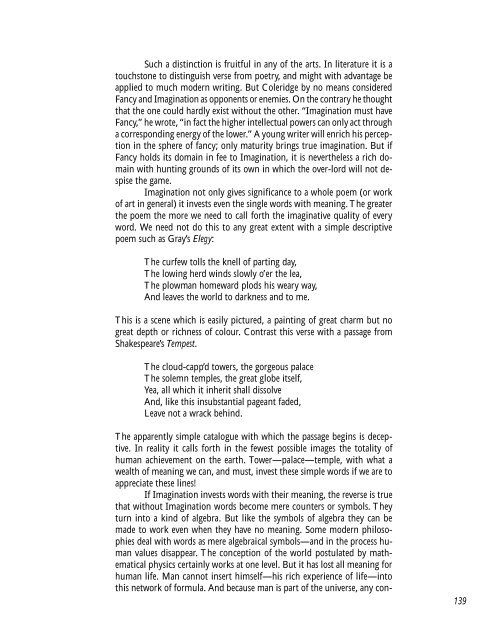Colloquium on English - Research Institute for Waldorf Education
Colloquium on English - Research Institute for Waldorf Education
Colloquium on English - Research Institute for Waldorf Education
Create successful ePaper yourself
Turn your PDF publications into a flip-book with our unique Google optimized e-Paper software.
Such a distincti<strong>on</strong> is fruitful in any of the arts. In literature it is a<br />
touchst<strong>on</strong>e to distinguish verse from poetry, and might with advantage be<br />
applied to much modern writing. But Coleridge by no means c<strong>on</strong>sidered<br />
Fancy and Imaginati<strong>on</strong> as opp<strong>on</strong>ents or enemies. On the c<strong>on</strong>trary he thought<br />
that the <strong>on</strong>e could hardly exist without the other. “Imaginati<strong>on</strong> must have<br />
Fancy,” he wrote, “in fact the higher intellectual powers can <strong>on</strong>ly act through<br />
a corresp<strong>on</strong>ding energy of the lower.” A young writer will enrich his percepti<strong>on</strong><br />
in the sphere of fancy; <strong>on</strong>ly maturity brings true imaginati<strong>on</strong>. But if<br />
Fancy holds its domain in fee to Imaginati<strong>on</strong>, it is nevertheless a rich domain<br />
with hunting grounds of its own in which the over-lord will not despise<br />
the game.<br />
Imaginati<strong>on</strong> not <strong>on</strong>ly gives significance to a whole poem (or work<br />
of art in general) it invests even the single words with meaning. The greater<br />
the poem the more we need to call <strong>for</strong>th the imaginative quality of every<br />
word. We need not do this to any great extent with a simple descriptive<br />
poem such as Gray’s Elegy:<br />
The curfew tolls the knell of parting day,<br />
The lowing herd winds slowly o’er the lea,<br />
The plowman homeward plods his weary way,<br />
And leaves the world to darkness and to me.<br />
This is a scene which is easily pictured, a painting of great charm but no<br />
great depth or richness of colour. C<strong>on</strong>trast this verse with a passage from<br />
Shakespeare’s Tempest.<br />
The cloud-capp’d towers, the gorgeous palace<br />
The solemn temples, the great globe itself,<br />
Yea, all which it inherit shall dissolve<br />
And, like this insubstantial pageant faded,<br />
Leave not a wrack behind.<br />
The apparently simple catalogue with which the passage begins is deceptive.<br />
In reality it calls <strong>for</strong>th in the fewest possible images the totality of<br />
human achievement <strong>on</strong> the earth. Tower—palace—temple, with what a<br />
wealth of meaning we can, and must, invest these simple words if we are to<br />
appreciate these lines!<br />
If Imaginati<strong>on</strong> invests words with their meaning, the reverse is true<br />
that without Imaginati<strong>on</strong> words become mere counters or symbols. They<br />
turn into a kind of algebra. But like the symbols of algebra they can be<br />
made to work even when they have no meaning. Some modern philosophies<br />
deal with words as mere algebraical symbols—and in the process human<br />
values disappear. The c<strong>on</strong>cepti<strong>on</strong> of the world postulated by mathematical<br />
physics certainly works at <strong>on</strong>e level. But it has lost all meaning <strong>for</strong><br />
human life. Man cannot insert himself—his rich experience of life—into<br />
this network of <strong>for</strong>mula. And because man is part of the universe, any c<strong>on</strong>-<br />
139

















